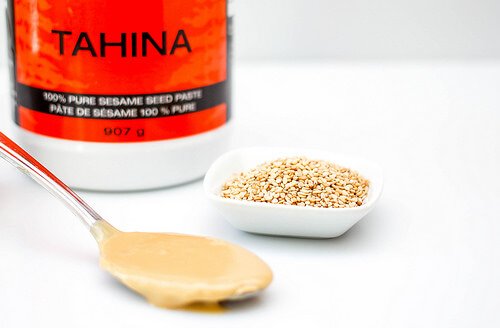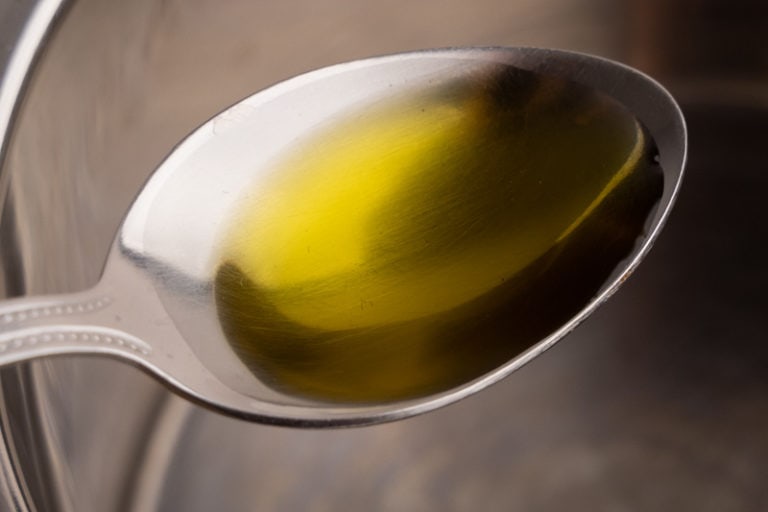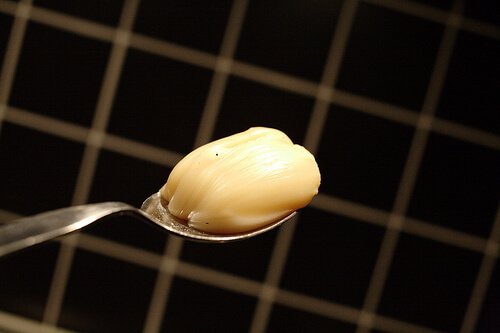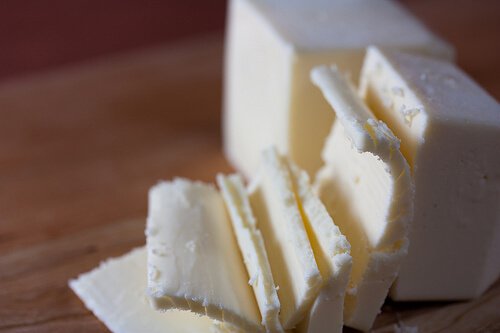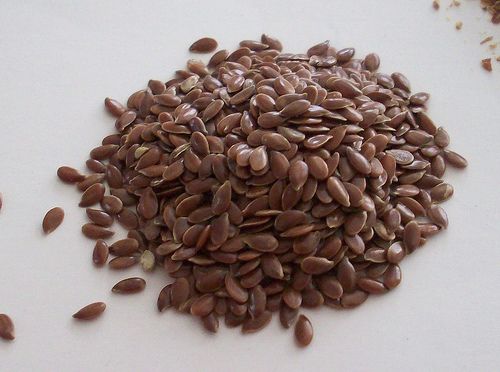Do Sunflower Seeds Go Bad?
Found an old pack of sunflower seeds and not sure if it’s still okay to eat or not? You have probably bought it to snack on while watching the game and forgot about it in all the excitement.
Now, a couple of months later, the package still sits in the cabinet in the pantry where you tossed it. Do sunflower seeds go bad?
In this short guide, we talk all about storage, shelf life, and spoilage of sunflower seeds. If that’s what you’re interested in, read on.
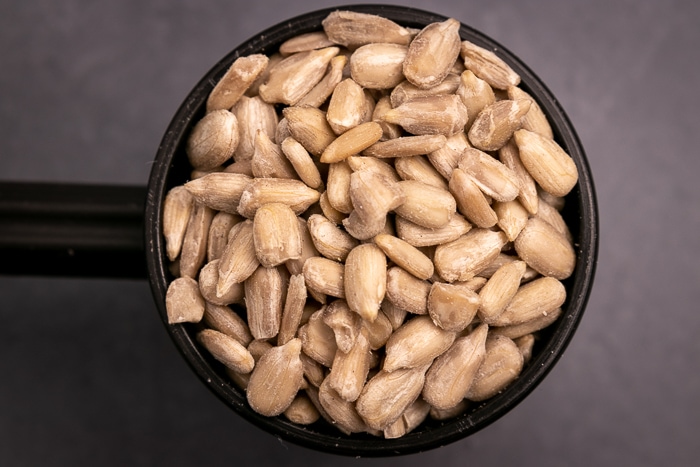
Do Sunflower Seeds Go Bad?
Sunflower seeds, similar to all other seeds, don’t last forever. If you store them long enough, the fat in the seeds will go rancid, and that’s when you should toss them.
You can tell that your sunflower seeds are rancid when they start to taste bitter or sour, perhaps reminding you of rancid olive oil. The seeds might also give off a chemical smell similar to putty or nail polish remover, but that’s not always obvious.
Of course, rancidity is the most likely way your sunflower seeds will go bad, but definitely not the only one. Let’s talk about others.
How to Tell if Sunflower Seeds Are Bad?
Toss your sunflower seeds if:
- They’re rancid. The number one way of oily seed spoiling is them going rancid. Rancidification is basically the oxidation of oils due to exposure to air, light, or moisture, and you can tell the seeds are rancid by either taste or smell.
- The bag is infested. You most likely store sunflower seeds at room temperature, perhaps in the pantry. So if you don’t use a well-sealed bag or container and have a problem with pantry bugs, you might find some unwanted visitors in your seeds. If you notice any larvae, eggs, or pests in your seeds, toss them.
- Mold. Mold comes last because it’s pretty unlikely for it to show up. If you follow proper storage guidelines and don’t let any water or moisture into the package, it’s hardly possible for it to grow.
You can observe the same signs of spoilage in other seeds, e.g., sesame seeds or pumpkin seeds.
Now, if you’re not entirely sure that the seeds are good to eat, discard them. Human intuition is quite good at spotting foods that are unsafe to eat. So if you feel that something is wrong with your sunflower seeds, trust that instinct.
But what if the seeds aren’t rancid but taste a bit stale?
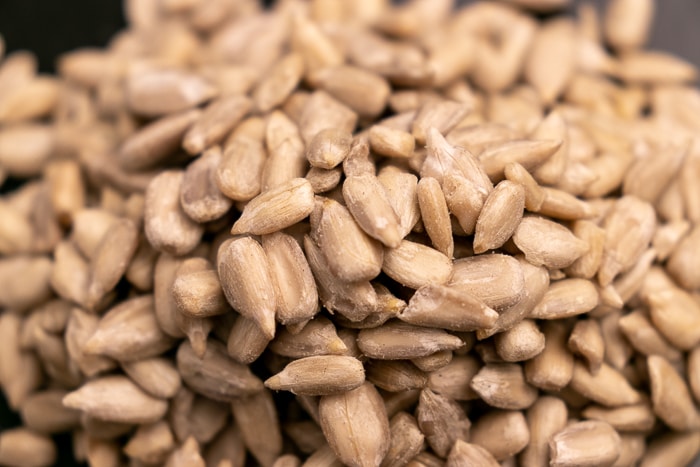
What to Do With Stale Sunflower Seeds?
If your sunflower seeds are stale, you can:
- Refresh them by roasting them on the stove or in the oven for a couple of minutes. You can drizzle them with cooking oil or melted butter and add a bit of salt for extra flavor.
- Feed them to the birds.
- Make sunflower seed butter. Since the seeds are stale, consider roasting them before processing and go with a flavored recipe that will cover the so-so taste of the seeds.
Can You Eat Expired Sunflower Seeds?
It depends.
If they’re “expired,” meaning the seeds are past the printed date, you certainly can eat them, assuming they show no spoilage signs.
But if by “expired” you mean rancid, then you probably shouldn’t.
Let me explain.
At the time of writing this article, there’s not much data on the health effects of eating rancid oils. Plus, there usually aren’t any immediate negative effects (besides the bad taste) of that, especially if you ingest small amounts.
But it’s quite possible that eating rancid fats may have adverse long-term health consequences, and that’s enough reason for me to avoid them.
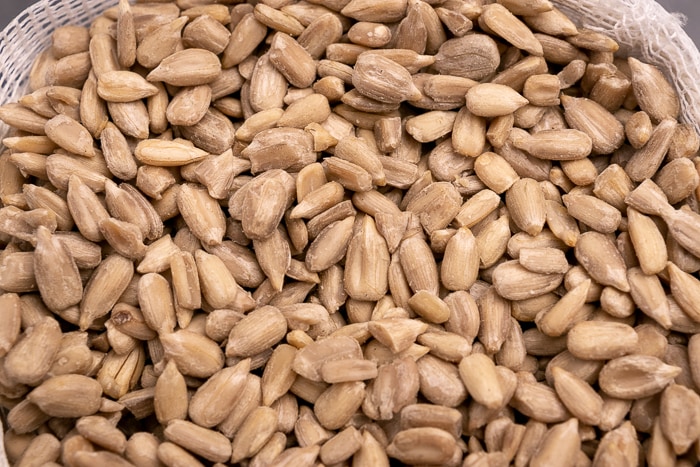
How Long Do Sunflower Seeds Last?
| Counter | Fridge | |
|---|---|---|
| Sunflower seeds, unopened | 1+ years | |
| Sunflower seeds, open | 6 months | 12 months |
| Roasted sunflower seeds, open | 3 months | 6+ months |
Sunflower seeds usually come with a shelf life of about a year, and as long as the bag is unopened, they easily keep for a few months past the printed date.
Once open, sunflower seeds retain quality for about six months if you leave them at room temperature or even up to a year if you refrigerate them.
If that’s not long enough, you can even freeze the seeds.
Remember that these periods are only estimates, as there’s no way to give you exact storage periods. That’s because it depends on where your sunflower seeds are stored, when the bag was open, and whether they’re shelled or roasted.
The good news is that the seeds last quite a long time without refrigeration, and “expired” seeds are often perfectly okay to eat.
Next, let’s briefly touch upon the different varieties of sunflower seeds that are available.
Shelled vs. Unshelled vs. Roasted vs. Unroasted
If your seeds are in-shell (unhulled), expect them to last a couple of months longer than their hulled (shelled) counterparts. That’s because the hull protects the kernel quite well from the environment outside, slowing down rancidification and overall quality deterioration.
When it comes to roasted versus unroasted seeds, the latter last longer and aren’t as prone to spoilage.
Roasting cuts the shelf life of open sunflower seeds in half. So if your half-open bag of unroasted sunflower seeds might keep quality for half a year in the pantry, you only get about three months in similar conditions after roasting them.
Roasted sunflower seeds have their structure changed, and as a result, fat comes into contact with oxygen more readily. That means more oxidation, which results in shorter shelf life.
That’s what happens to roasted nuts, and I’m pretty sure the same thing happens to seeds.
Now, let’s talk about the date printed on the label.
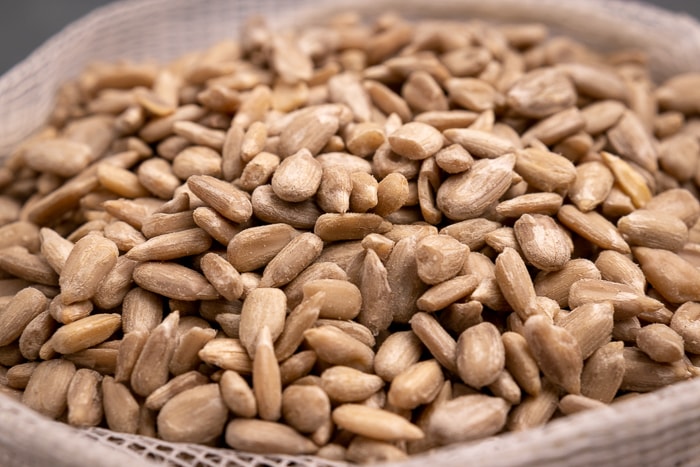
After Expiration Date
The date printed on the bag of store-bought sunflower seeds is only an estimate of how long they should retain quality. But the seeds could just as well keep quality way past that date, which happens often, or go rancid before it, depending on storage conditions.
So if your sunflower seeds are already “expired,” check them for spoilage signs, and if everything seems okay, feel free to eat them.
Obviously, if the seeds are like two years past their date, you might toss them simply because that’s too long, not necessarily because there are noticeable spoilage signs.
(If the seeds are stale, there are a few things you might want to try.)
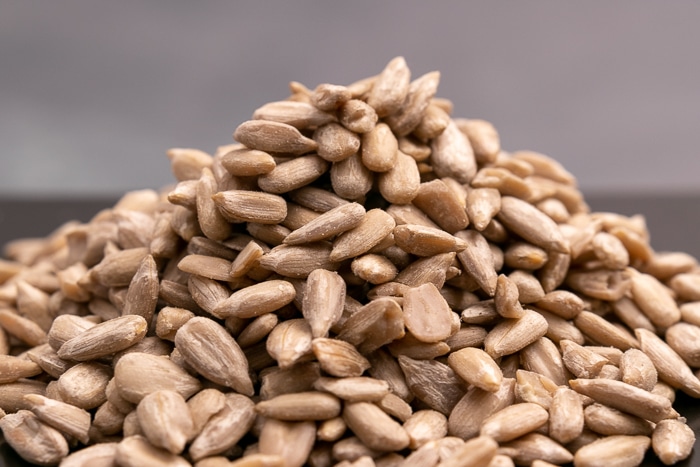
How to Store Sunflower Seeds
Store your sunflower seeds in a cool, dry place away from sunlight, sealed tight in an airtight container or resealable bag. They can sit in the kitchen or pantry, or if you want to prolong their shelf life, you can refrigerate them.
As long as the bag is unopened, it can sit at ambient temperature for months without much quality loss. Once you open it, leaving sunflower seeds at room temperature is okay, as long as you don’t expect them to last for months on end.
The rule of thumb is that the more processed the seeds are, the better storage conditions they need to last long. That means that shelled sunflower seeds need better protection than in-shell ones, roasted need better packaging than unroasted, and so on.
Obviously, it would be ideal if you stored the seeds in a freezer bag in the fridge or freezer. That’s because cold temperatures protect the seeds against rancidity, the most common cause of their spoilage.
But unless you need those seeds to last months or you have lots of room in the refrigerator, that’s not required.
Last, if you decide to refrigerate sunflower seeds, ensure they’re in something airtight and sealed tight. Otherwise, they might pick up some smells or moisture and end up spoiled or smelly.
Rotten Records: Share Your Snap!
Caught some food past its prime? Upload your photo to “Rotten Records” and help others spot the signs of spoilage. Every image makes our food community safer and more informed!
